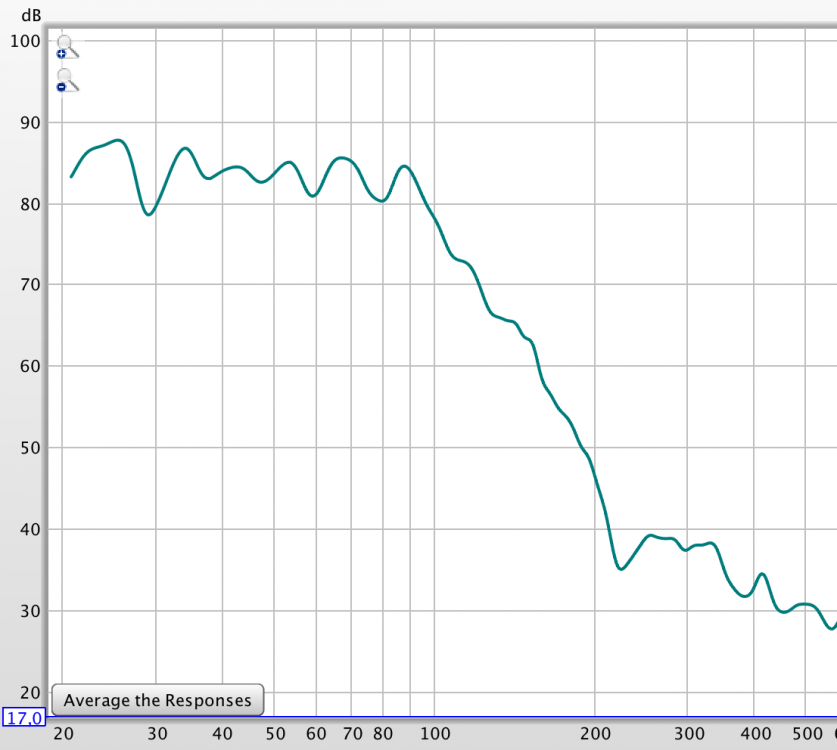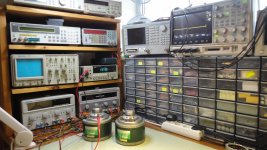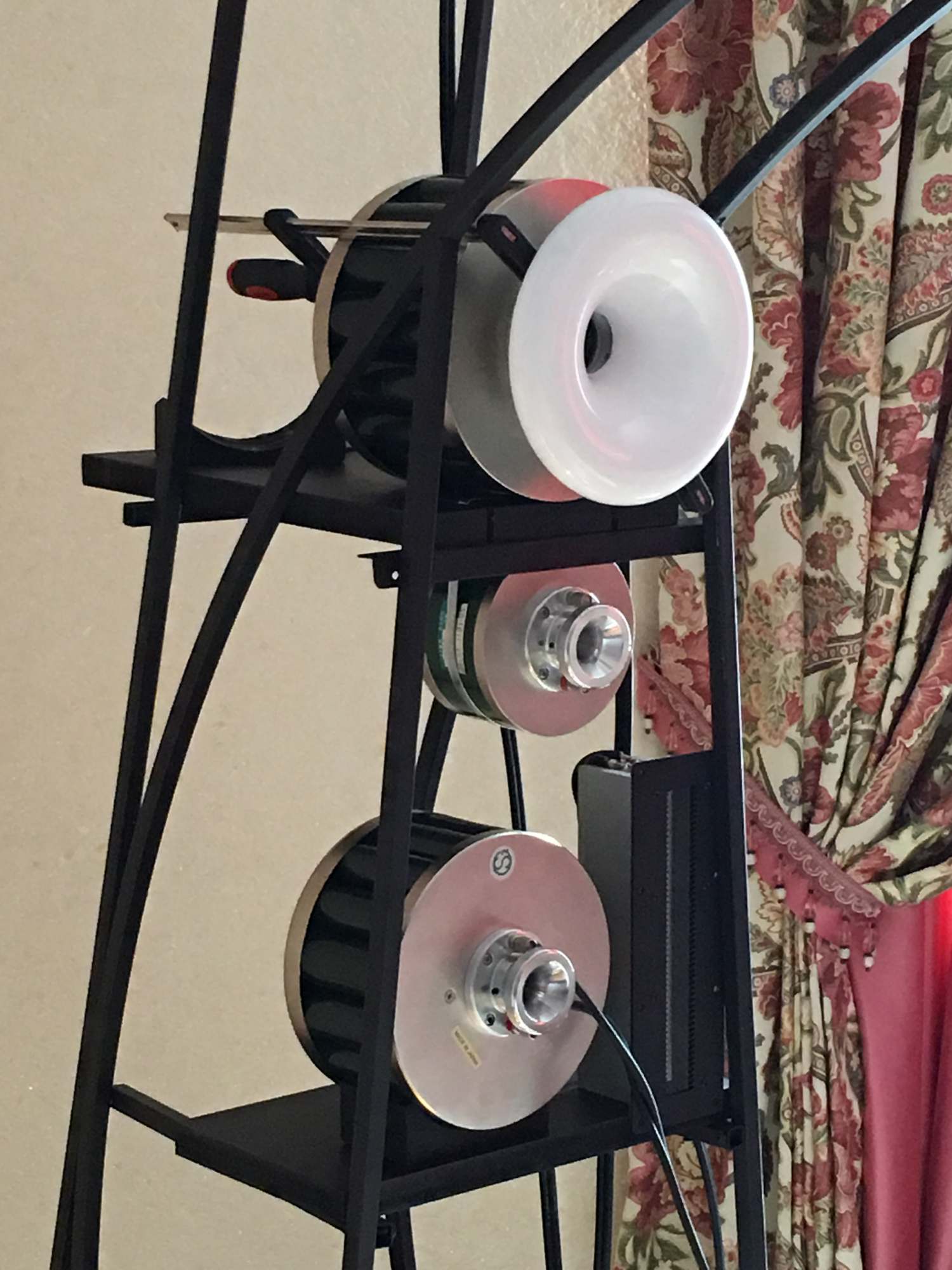Well, that's the thing I was wondering because 3rd order filters aren't exactly sharp if you are using the horn for only one octave, they are overlapping with the next driver above and below with -9dB or less difference for half of their reproduction band. I'm not saying you are doing it wrong but that's not exactly sharp xo at all for a 6-way speaker.
Hi,
Sharp crossovers are not necessarily the best for multiway horn systems like this. While distortion and coloration due to out of band bad response would depend on the exact drivers used, I know in my 4 way system lower order slopes can give better control of directivity in the crossover region. This effects how the system drives the room and the final tonal balance you perceive in-room. This would be the classic advantage of a 6-way system versus some lesser number of drivers - you can use the greater overlap to run lower order crossovers. For some DI examples from my system, see:
http://www.diyaudio.com/forums/multi-way/280622-axis-off-axis-response.html#post4475319
http://www.diyaudio.com/forums/multi-way/100392-beyond-ariel-635.html#post4386135
Hi,
Sharp crossovers are not necessarily the best for multiway horn systems like this.
Well, I see it differently, but that's not the point (I would let my ears decide though but my experience says otherwise). The thing is, you can't call that 'sharp' filters at all.
While distortion and coloration due to out of band bad response would depend on the exact drivers used, I know in my 4 way system lower order slopes can give better control of directivity in the crossover region. This effects how the system drives the room and the final tonal balance you perceive in-room. This would be the classic advantage of a 6-way system versus some lesser number of drivers - you can use the greater overlap to run lower order crossovers.
Well, that's exactly the argument to use other horn types, which a. have much wider usable bandwidth and b. while maintaining constant beamwidth. I understand you love the look and style of spherical horns but from the acoustical point of view they're not the best choice.
Very interesting, Kodomo, to listen to your system one day.
I'm visiting exhibition sometimes in Istanbul, are you not far from there ?
And you are welcome to my home when in Moscow!
Thanks, I am mainly located at Antalya, my place in Istanbul does not have a soundsytem like the one at Antalya. You are welcome to visit both of course 🙂 I have a hotel at Antalya and had a lots of dealings with Russian market so visiting Moscow was a part of my job. Nowadays you know the situation, but hopefully soon things will go back to being normal and we will have peaceful and joyful days again...
Back to topic: When you use your horns down to their cf, first of all there is no horn loading, so there is a difference in spl between that frequency and at the frequency where the horn is actually loading. Do you use digital crossovers and boost those frequencies? Maybe adjacent channel is making up for it and levelling it out, so you are not hearing that, still I am puzzled by this approach...
I also see this approach (mostly) with basshorns that actually do not load the frequency people want to go down to. They boost with eq but that is not horn loading, that is direct radiator behind a horn and then you do not have the advantages of a horn.
Also about exact time aligning around 40-50 or even up to 60hz. This I tried with digital as well. You do not need to have perfect time alignment around those freqs. It is important but you do not need to be very precise. I phase correct my tapped horn, otherwise it works against my bass boxes and can cause cancellations around crossover region. Time shifting all frequencies (time alignment) did not create any audible difference than phase aligning (shifting frequencies more close to the crossover point) with my tapped horn. So I use the hypex amps phase circuit onboard with its onboard crossover. I align it physically as much as possible and actually I work very little on my phase encoder, like a small notch. It is sitting much closer to me than my horns because of its folded path.
For hornfabrik, I could not do what they had done with my crossovers. MY first order filters, and the proposed filters by engineers or friends and also the dsp I tried has nothing on the crossover they have done. It sounds great and although they look complicated, it sounds like they are not there at all.
Yes , thats true Goto is on its own level ...
Just checked it compared to my Yamahas and TAD's .
Attachments
my wife would say to that : Thats a big no no, dear....... Honey, either these horns, or me.....
anyway, you must have a lot of reflections at the double horn throat . A nice source of colorations....
Reflections are possible at higher octaves when driver is not loaded. That is why I'm not using more than 2 octaves and have "sharp" low pass filters.
I prefer to have a gap between drivers than to have coloration.
Agree. I call "sharp" for higher than 1st order 🙂Well, I see it differently, but that's not the point (I would let my ears decide though but my experience says otherwise). The thing is, you can't call that 'sharp' filters at all.
Well, that's exactly the argument to use other horn types, which a. have much wider usable bandwidth and b. while maintaining constant beamwidth. I understand you love the look and style of spherical horns but from the acoustical point of view they're not the best choice.
Which shape exactly do you suggest to consider ?
And why I need wide bandwidth ?
Yes, sure...once you plan Moscow visit - write me 🙂Thanks, I am mainly located at Antalya, my place in Istanbul does not have a soundsytem like the one at Antalya. You are welcome to visit both of course 🙂 I have a hotel at Antalya and had a lots of dealings with Russian market so visiting Moscow was a part of my job. Nowadays you know the situation, but hopefully soon things will go back to being normal and we will have peaceful and joyful days again...
No, I'm not using digital crossover. LeCleach profile really works from cf and even lower! You can play with HornResp and see how it works. Really amazing!Back to topic: When you use your horns down to their cf, first of all there is no horn loading, so there is a difference in spl between that frequency and at the frequency where the horn is actually loading. Do you use digital crossovers and boost those frequencies? Maybe adjacent channel is making up for it and levelling it out, so you are not hearing that, still I am puzzled by this approach...
In my case, for 20-50hz region horn works like screen to eliminate acoustical short circuit. So, yes, I don't have horn loading, but still I have 20-30hz with near 100db sensitivity and can easily TimeAlign it with the rest! That is why I like it!I also see this approach (mostly) with basshorns that actually do not load the frequency people want to go down to. They boost with eq but that is not horn loading, that is direct radiator behind a horn and then you do not have the advantages of a horn.
I'm still trying to avoid digital...don't want to lost opportunity to try vinyl one day 🙂Also about exact time aligning around 40-50 or even up to 60hz. This I tried with digital as well. You do not need to have perfect time alignment around those freqs. It is important but you do not need to be very precise. I phase correct my tapped horn, otherwise it works against my bass boxes and can cause cancellations around crossover region. Time shifting all frequencies (time alignment) did not create any audible difference than phase aligning (shifting frequencies more close to the crossover point) with my tapped horn. So I use the hypex amps phase circuit onboard with its onboard crossover. I align it physically as much as possible and actually I work very little on my phase encoder, like a small notch. It is sitting much closer to me than my horns because of its folded path.
And tapped horns looks too slow for me...they excite the room and bass decay to slow.
[/quote]For hornfabrik, I could not do what they had done with my crossovers. MY first order filters, and the proposed filters by engineers or friends and also the dsp I tried has nothing on the crossover they have done. It sounds great and although they look complicated, it sounds like they are not there at all.
I really worry about every additional element in crossover. I prefer to have curve spl then to lost any detail in music. The only reason why I'm still thinking about digital crossover, because in this case I'll not need any element in crossover. So, I have to try this way one day!
Yes , thats true Goto is on its own level ...
Just checked it compared to my Yamahas and TAD's .
Wow! Serious corner 🙂
Never had experience with Yamahas, but TADs I don't like...
My friend has Cessaro Gamma and sound is terrible for me.
I also compared TAD2001 with old JBL LE85 in my system and preferred JBL.
Wow! Serious corner 🙂
Never had experience with Yamahas, but TADs I don't like...
My friend has Cessaro Gamma and sound is terrible for me.
I also compared TAD2001 with old JBL LE85 in my system and preferred JBL.
Yamahas 6681 are good . Poors man Goto 🙂 Goes down to 300Hz at lover levels.
With your "no budget" thing , you also should try Onken drivers . Somethimes they show on Japan Yahoo.
Last edited:
Yes, I've tried it in 270hz horn and it works great!Yamahas 6681 are good . Poors man Goto 🙂 Goes down to 300Hz at lover levels.
But 1000hz from very deep 270hz horn not perfect.
So after all I've decided to use it in 400hz horn.
May be 350hz is optimal!
With your "no budget" thing , you also should try Onken drivers . Somethimes they show on Japan Yahoo.
I'm so happy with current result that I don't have motivation anymore 🙂
Last edited:
With the older GOTO drivers you were able to remove their throat adapters so it didn't have the small 1" opening. Have you tried doing this so you don't need to go from the native large exit to the GOTO smaller throat back to another adapter for the JMLC horns?
nice job man but wasn't it better to buy a Cessaro or Vox Olympian if you wanted to spend that much of money? you really bought those bass compression drivers for 25K? really?
With the older GOTO drivers you were able to remove their throat adapters so it didn't have the small 1" opening. Have you tried doing this so you don't need to go from the native large exit to the GOTO smaller throat back to another adapter for the JMLC horns?
Yes, I did it for all GOTO drivers. I've removed their throat adapters to decrease compression and removed phase plugs.
nice job man but wasn't it better to buy a Cessaro or Vox Olympian if you wanted to spend that much of money? you really bought those bass compression drivers for 25K? really?
No, I got used ones with good discount from this guy:

Regarding Cessaro and Vox Olympian...I'm not fan of TAD drivers.
GOTO is in another league for my taste!
May be Magico Ultimate 3 is something close to GOTO, but still bass channels are ordinary in their implementation and not TimeAligned.
I think, that GOTO SG-146LD-4 is something very special and looks like I'm gonna use them from 20hz! So, the whole system will be compression drivers driven, but without compression 🙂
Piece unique, I believe 🙂
Today I did some measurements of horn LHF section with GOTO bass driver!

And this is what I got from bass driver in 25Hz horn with 4th order passive filter:


And this is what I got from bass driver in 25Hz horn with 4th order passive filter:

Very nice!
What do you mean by "compression drivers without compression"? Is the horn throat = sd of driver?
Best regards Gisle
What do you mean by "compression drivers without compression"? Is the horn throat = sd of driver?
Best regards Gisle
- Home
- Loudspeakers
- Multi-Way
- GOTO 6-way TimeAligned Horn System


